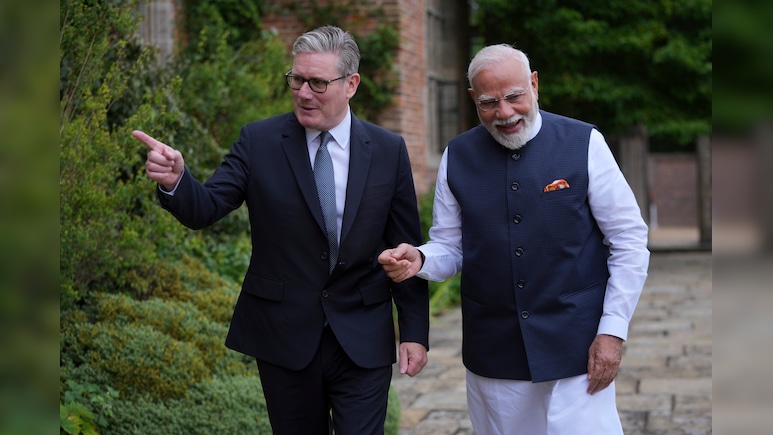The recent signing of the Comprehensive Economic and Trade Agreement (CETA) between India and the United Kingdom marks far more than a simple reduction in tariffs. It is an inflexion point, a strategic pivot that promises to redefine the contours of a historically rich yet often complex relationship.
This landmark agreement, poised to nearly double bilateral trade to over $112 billion by 2030, is not merely about immediate economic gains; it is a profound testament to a maturing partnership and a critical investment in the prosperity and opportunities for future generations in both nations.
Moving Forward
For too long, the narrative of Indo-UK relations has been shadowed by the echoes of a colonial past. While that history must never be forgotten, it is equally crucial to acknowledge the evolving dynamics of a modern, democratic India and a globally engaged Britain. The CETA actively seeks to transcend this historical baggage, forging a bond based on mutual respect, shared values, and reciprocal economic benefit. It acknowledges India's emergence as a global economic powerhouse and the UK's post-Brexit aspiration to forge new, dynamic trade alliances. This agreement, therefore, is not a relic of the past, but a blueprint for a forward-looking, contemporary partnership.
What's On Offer
From India's perspective, the agreement offers unprecedented market access to one of the world's most sophisticated economies. With 99% of Indian exports gaining duty-free access to the UK market, sectors like textiles, leather goods, marine products, gems and jewellery, and engineering goods stand to gain immensely. These are often labour-intensive sectors, and the elimination of tariffs will not only boost export volumes but also create significant employment opportunities across India. This is a powerful enabler of the 'Make in India' initiative, allowing Indian manufacturers to compete more effectively on a global stage and integrate deeper into international supply chains. The potential for Indian farmers to access premium UK markets for agricultural produce, with tariffs eliminated on 95% of agricultural and processed food exports, is another significant boon, offering diversification and better prices. Furthermore, the easing of professional mobility for Indian skilled workers and professionals into 35 UK sectors for up to two years, without the need for a local office, is a game-changer for India's services sector, fostering cross-cultural collaboration and knowledge exchange.
From the British point of view, the UK stands to gain substantial access to India's burgeoning market of 1.4 billion people, with our rapidly growing middle class and increasing disposable incomes. The significant reduction in India's historically high tariffs on key British exports, such as Scotch whisky, automobiles, and medical devices, opens up vast new avenues for British businesses. The immediate halving of whisky duties, with further reductions to 40% over a decade, is a particularly welcome development for a flagship British industry - as Prime Minister Keir Starmer was quick to note.
Similarly, the dramatic tariff reduction on electric vehicles from 110% to 10% under specified quotas signals a strategic opening for UK car manufacturers. Beyond goods, the agreement's comprehensive provisions on services and digital trade are crucial for the UK's service-driven economy, ensuring greater certainty and transparency for businesses. The commitment to streamline customs procedures and reduce technical barriers will make trade faster and more efficient, benefiting businesses of all sizes, particularly SMEs.
Deeper Than Just Trade
The true significance of this agreement, however, lies not just in the immediate economic uptick, but in its potential to shape a qualitatively better relationship for future generations. By institutionalising frameworks for cooperation in areas beyond traditional trade, such as innovation, research, climate action, and education, the CETA lays a robust foundation for a truly comprehensive partnership. The 'Vision 2035' roadmap, agreed alongside the CETA, emphasises collaborations in defence, technology, and green energy, recognising the shared strategic interests and global challenges both nations face. Defence is a new development and, given the “hesitations of history”, a particularly striking one.
This holistic approach ensures that the benefits of the agreement will ripple far beyond mere financial transactions, fostering deeper understanding and shared progress.
A Shared World
For young Indians and Britons, this agreement opens up a world of interconnected opportunities. Easier access to each other's markets will lead to a greater variety of goods and services, potentially lowering prices for consumers. It will encourage more cross-border investment, leading to job creation and economic dynamism. The provisions for professional mobility and mutual recognition of qualifications will facilitate educational and career pathways, allowing future generations to learn from and contribute to each other's societies. It will foster a climate of collaboration in cutting-edge fields like AI, clean energy, and healthcare, addressing global challenges through joint research and development.
Moreover, the CETA's inclusion of progressive chapters on social and developmental issues, such as labour rights, gender equality, and anti-corruption, sets a new benchmark for India's trade negotiations. This commitment to ethical and sustainable trade practices underscores a shared vision for responsible globalisation, offering a hopeful precedent for future international agreements. It signals to future generations that economic prosperity need not come at the expense of social justice or environmental responsibility.
An Inheritance Of Opportunities
In an increasingly fragmented and uncertain global landscape, the Indo-UK Trade Agreement stands as a powerful testament to the enduring value of international cooperation and open markets. It is a bold statement that nations, even with diverse histories, can forge new paths of partnership based on mutual benefit and shared aspirations.
Prime Minister Narendra Modi has hailed the significance of the trade agreement for future generations. Indeed, for the young, this agreement is not just a trade deal; it is an inheritance of enhanced opportunities, deeper cultural understanding, and a more interconnected and prosperous world. It is an inflexion point - indeed, a turning of the page - to a qualitatively better, and brighter, shared future.
(Shashi Tharoor has been a Member of Parliament from Thiruvananthapuram, Kerala, since 2009. He is an author and a former diplomat.)
Disclaimer: These are the personal opinions of the author



